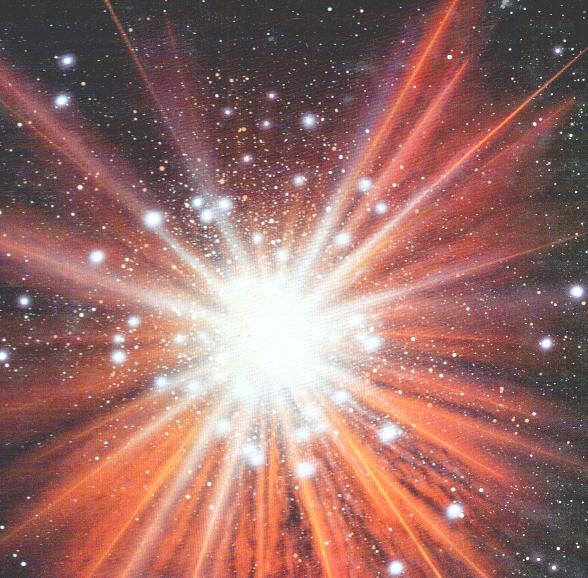
My very first angry, mean-spirited, ad hominem attack-column for 2018 has now appeared in the Deseret News:
“Focusing on the essentials in the biblical story of creation”
Just this morning, alas, I found a passage that would have fit perfectly into my column (had there been space in the column in which to fit it!). It comes from David Wilkinson, God, Time and Stephen Hawking: An Exploration Into Origins (London: Monarch Books, 2001). Rev. Dr. Wilkinson is speaking about the “Big Bang.” First, a preliminary historical note:
This term was coined by one of the most vehement critics of the Big Bang, Sir Fred Hoyle, as a term of derision dropped into a radio broadcast for a theory that he described as being about as elegant as a party girl jumping out of a cake! (45-46)
Here’s the passage I would like to have incorporated into my column:
The expansion was so rapid and so violent that it is helpful to think of it in terms of an explosion — the Big Bang. However, we must be careful of the term, as an explosion suggests the sense of something that creates destruction and disorder. It also suggests ‘bits’ flying out into something, which we will see is not the case. A better picture may be the blooming of a flower, that is something that gives rise to order and beauty. (47)
Incidentally, Rev. Dr. Wilkinson is a British theologian — he holds a Ph.D. in systematic theology — affiliated with St. John’s College at the University of Durham. So what does he know? He also happens to have earned a Ph.D. in theoretical astrophysics, focusing on the study of star formation and the chemical evolution of galaxies, and he is a Fellow of the Royal Astronomical Society.
Another incidental comment:
Among the most (unintentionally) amusing aspects of god is Not Great, the best-selling New Atheist screed written by the late Christopher Hitchens, was its treatment of Sir Fred Hoyle (d. 2001), whom Hitchens wrote off as “an ex-agnostic who became infatuated with the idea of ‘design’” (65). There can be little doubt that, had Hitchens realized the truth about Hoyle, Hoyle would — like all of the other atheist writers and scientists cited in the book — have been both “distinguished” and “brilliant.” Others certainly thought he was.
He was, for instance, elected to the Royal Society of London (1957), the American Academy of Arts and Sciences (1964), the United States National Academy of Sciences (1969), the Royal Irish Academy (1977), and the American Philosophical Society (1980). His many honors include the United Nations Kalinga Prize and the Gold Medal of the Royal Astronomical Society in 1968, the Bruce Medal from the Astronomical Society of the Pacific in 1970, a knighthood in 1972, the Royal Medal of the Royal Society in 1974, the Dag Hammarskjöld Gold Medal, the Karl Schwarzchild Medal of the Astronomische Gesellschaft of Germany in 1992, the Balzan Prize in 1994, and the Crafoord Prize from the Royal Swedish Academy of Sciences in 1997.
Martin Rees, Astronomer Royal of England as well as professor of cosmology and astrophysics and master of Trinity College at the University of Cambridge, paid tribute to him at his death in 2001, saying,
Hoyle’s enduring insights into stars, nucleosynthesis, and the large-scale universe rank among the greatest achievements of 20th-century astrophysics. Moreover, his theories were unfailingly stimulating, even when they proved transient. He will be remembered with fond gratitude not only by colleagues and students, but by a much wider community who knew him through his talks and writings.
Sir Fred Hoyle seems an unlikely ignoramus.
But Hitchens’s error is even deeper and more painful than that. He seems to have imagined that Hoyle’s derisive rejection of Big Bang cosmology (and his advocacy of the now-defunct rival “Steady State” theory) was resulted from Hoyle’s supposed desire to defend a theistic notion of creation. But Hoyle hated what he mocked as the “Big Bang” precisely because, as an atheist, he thought it came too close to the biblical doctrine of divine creation (“Let there be light!”).
After all, one of the originators of the Big Bang theory was the great Belgian mathematician, physicist, and (ugh!) Catholic priest Father Georges Lemaître. And, in 1951, no less a figure than Pope Pius XII had commented on the theory as follows,
Thus, with that concreteness which is characteristic of physical proofs, it [science] has confirmed the contingency of the universe and also the well-founded deduction as to the epoch when the cosmos came forth from the hands of the Creator. Hence, creation took place in time. Therefore, there is a Creator. (cited at Wilkinson, 25)












